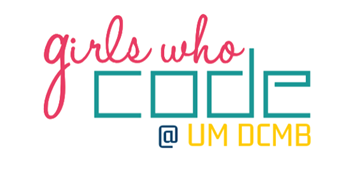Empowering Tomorrow’s Innovators: Kids Who Code
COMPASS tightly integrates research, education, outreach, and knowledge transfer programs to maximize our societal impact. The primary objective of the Center is to provide students from underrepresented backgrounds a pathway to gain the education and support needed to successfully pursue a career in STEM. This initiative will be interconnected across all seven campuses.
In 2017 UM graduate students in the Department of Computational Medicine and Bioinformatics, supervised and guided by UM faculty, launched the “Girls Who Code” (GWC) organization which provides a “fun and supportive environment for high school women to learn the power of coding.” The program was transferred to a virtual format because of the COVID-19 epidemic, engaging students in multiple schools in 30 cities, including 11 cities outside of Michigan encompassing California, Maryland, North Dakota, North Carolina, and Alabama, among others.

GWC has achieved exceptional educational outcomes with 75% of participants wanting to pursue STEM careers, 80% reporting an increase in self-confidence, and 62% still coding. Our program will differentiate from others that teach coding to kids (e.g., Thinkabit Lab, Kids that Code, Robotics and Kids) by (1) focusing on high school students in years critical for their career choices (2) carrying out longitudinal studies by qualified researchers in the field establishing the best practices and methodologies for further success.
We will start with graduate student instructors funded as PhD researchers at UM, USC, and WSU in the first year and expand it to include PhD students at UIUC and NEU in the second year, and NCSU and CSU in the third year. We will train our initial cohort of graduate students using GWC executive committee members and the GWC framework. This cohort will also develop Graph Theoretical Python modules, drawing on insights from the research components of the Center. Graduate student instructors will be assessed on their competence and growth in skill through an annual faculty–grad student program appraisal, with each student communicating successes and challenges experienced during that year, under the guidance of a group of three COMPASS faculty. We will spearhead the expansion of KWC by online dissemination of program information on the Center website, associated labs, institutions, and social media. We expect to start with 10 students in the first year of the program and grow to 20 per year at steady state, with a ratio of 2-3 students per graduate student instructor. While the program will be national, we will utilize partner institution networks to advertise and recruit, where applicable, such as UM’s Office of Culture, Community and Equity’s K-12 Engineering OnRamp programs. Engineering OnRamp serves over 1,000 K-12 students per year mostly from the Southeast Michigan and Detroit metro area in STEM pathway programs and has programmatic partnerships with local schools and community organizations like DAPCEP, SMASH, and AI4ALL.

The KWC curriculum will be delivered in “bite-size” weekly lessons, followed by independent practice time to reinforce coding concepts and a capstone project with real-world data. Materials will be added through the Open Educational Resources site on GitHub. The basic pedagogy will be based on the “I do, we do, you do” didactic paradigm focusing on active student-centered learning. Completion of the curriculum will end with a capstone project that draws the students into integrating their learnings into creative coding for real-world problems and ongoing tasks in COMPASS.
Through COMPASS, KWC participants will receive training in experimental science through a one-day module on imaging and graphing colloidal structures built from the research content developed by COMPASS. KWC participants will participate in an in-person graduation ceremony at the end of the program, which will occur at the same time as the COMPASS summer summit and the completion of the HARES and ROSBA programs. We want all the high school students to meet each other, which will encourage application of HARES students to KWC and ROSBA and vice versa, thus deepening COMPASS’s impact.
This material is based upon work supported by the National Science Foundation under Award No. 2243104.
Any opinions, findings and conclusions or recommendations expressed in this material are those of the author(s) and do not necessarily reflect the views of the National Science Foundation.
